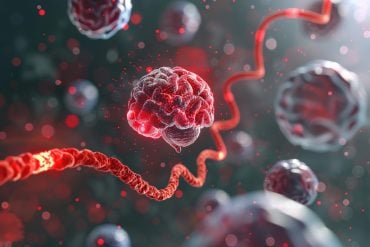Summary: Researchers discovered that reducing the amino acid isoleucine in diets can significantly improve health outcomes in mice.
The study reveals that a low-isoleucine diet led to longer lifespans, leaner bodies, and reduced cancer and prostate problems in mice, despite higher calorie consumption.
The findings suggest that isoleucine intake impacts health beyond its caloric value, offering insights into healthy aging and metabolic processes.
This research could pave the way for new dietary recommendations and treatments aimed at improving human health.
Key Facts:
- A diet low in isoleucine extended the lifespan of mice and improved various health metrics, including body leanness and reduced disease risks.
- Mice on this diet consumed more calories but maintained leaner bodies and better health due to metabolic adjustments.
- The study links dietary amino acids to aging processes and healthspan, challenging the traditional view that “a calorie is just a calorie.”
Source: University of Wisconsin-Madison
There’s a popular saying in some circles that “a calorie is a calorie,” but science shows that it may not be true. In fact, it may be possible to eat more of some kinds of calories while also improving your health.
“We like to say a calorie is not just a calorie,” says Dudley Lamming, a professor and metabolism researcher at the University of Wisconsin School of Medicine and Public Health.
“Different components of your diet have value and impact beyond their function as a calorie, and we’ve been digging in on one component that many people may be eating too much of.”

Lamming is the lead author of a new study in mice, published recently in the journal Cell Metabolism, showing that cutting down the amount of a single amino acid called isoleucine can, among other benefits, extend their lifespan, make them leaner and less frail as they age and reduce cancer and prostate problems, all while the mice ate more calories.
Amino acids are the molecular building blocks of proteins, and Lamming and his colleagues are interested in their connection to healthy aging.
In earlier research, data from UW–Madison’s Survey of the Health of Wisconsin showed the scientists that Wisconsinites with higher body mass index measurements (higher is more overweight or obese) tend to consume more isoleucine, an essential amino acid everyone needs to eat. Isoleucine is plentiful in foods including eggs, dairy, soy protein and many kinds of meat.
To better understand its health effects, Lamming and collaborators from across disciplines at UW–Madison fed genetically diverse mice either a balanced control diet, a version of the balanced diet that was low in a group of about 20 amino acids, or a diet formulated to cut out two-thirds of the diet’s isoleucine. The mice, which began the study at about 6 months of age (equivalent to a 30-year-old person) got to eat as much as they wanted.
“Very quickly, we saw the mice on the reduced isoleucine diet lose adiposity — their bodies got leaner, they lost fat,” says Lamming, while the bodies of the mice on the low-amino-acid diet also got leaner to start, but eventually regained weight and fat.
Mice on the low-isoleucine diet lived longer — on average 33% longer for males and 7% longer for females. And, based on 26 measures of health, including assessments ranging from muscle strength and endurance to tail use and even hair loss, the low-isoleucine mice were in much better shape during their extended lives.
“Previous research has shown lifespan increase with low-calorie and low-protein or low-amino-acid diets starting in very young mice,” says Lamming, whose work is supported by the National Institutes of Health.
“We started with mice that were already getting older. It’s interesting and encouraging to think a dietary change could still make such a big difference in lifespan and what we call ‘healthspan,’ even when it started closer to mid-life.”
The mice on the low-isoleucine diets chowed down, eating significantly more calories than their study counterparts — probably to try to make up for getting less isoleucine, according to Lamming. But they also burned far more calories, losing and then maintaining leaner body weights simply through adjustments in metabolism, not by getting more exercise.
At the same time, Lamming says, they maintained steadier blood sugar levels and male mice experienced less age-related prostate enlargement. And while cancer is the leading cause of death for the diverse strain of mice in the study, the low-isoleucine males were less likely to develop a tumor.
Dietary amino acids are linked to a gene called mTOR that appears to be a lever on the aging process in mice and other animals as well as to a hormone that manages the body’s response to cold and has been considered a potential diabetes drug candidate for human patients. But the mechanism behind the stark benefits of low-isoleucine intake is not well understood. Lamming thinks the new study’s results may help future research pick apart causes.
“That we see less benefit for female mice than male mice is something we may be able to use to get to that mechanism,” he says.
While the results are promising, humans do need isoleucine to live. And winnowing a significant amount of isoleucine out of a diet that hasn’t been preformulated by a mouse chow company is not an easy task.
“We can’t just switch everyone to a low-isoleucine diet,” Lamming says. “But narrowing these benefits down to a single amino acid gets us closer to understanding the biological processes and maybe potential interventions for humans, like an isoleucine-blocking drug.”
The Survey of the Health of Wisconsin showed that people vary in isoleucine intake, with leaner participants tending to eat a diet lower in isoleucine. Other data from Lamming’s lab suggest that overweight and obese Americans may be eating significantly more isoleucine than they need.
“It could be that by choosing healthier foods and healthier eating in general, we might be able to lower isoleucine enough to make a difference,” Lamming says.
Funding: This research was funded in part by grants from the National Institutes of Health (AG056771, AG062328, AG081482, AG084156, DK125859, F31AG066311, R01AG062328-03S1, F31AG081115, F31AG082504, T32AG000213, F32AG077916, RF1AG056771-06S1, K01AG059899, R01DK133479, P30DK020579, K12HD101368, R01AA029124, P30 CA014520, P50DE026787, U54DK104310, R01DK131175 and P30CA014520) and the U.S. Department of Veterans Affairs (I01-BX004031).
About this longevity research news
Author: Chris Barncard
Source: University of Wisconsin-Madison
Contact: Chris Barncard – University of Wisconsin-Madison
Image: The image is credited to Neuroscience News
Original Research: Closed access.
“Dietary restriction of isoleucine increases healthspan and lifespan of genetically heterogeneous mice” by Dudley Lamming et al. Cell Metabolism
Abstract
Dietary restriction of isoleucine increases healthspan and lifespan of genetically heterogeneous mice
Highlights
- Isoleucine restriction (IleR) improves metabolic health in both sexes
- IleR reprograms hepatic metabolism in a sex- and age-dependent manner
- IleR reduces frailty and increases lifespan, with stronger effects on male lifespan
- Amino acid restriction begun at 6 months extends healthspan but not lifespan
Summary
Low-protein diets promote health and longevity in diverse species. Restriction of the branched-chain amino acids (BCAAs) leucine, isoleucine, and valine recapitulates many of these benefits in young C57BL/6J mice.
Restriction of dietary isoleucine (IleR) is sufficient to promote metabolic health and is required for many benefits of a low-protein diet in C57BL/6J males.
Here, we test the hypothesis that IleR will promote healthy aging in genetically heterogeneous adult UM-HET3 mice.
We find that IleR improves metabolic health in young and old HET3 mice, promoting leanness and glycemic control in both sexes, and reprograms hepatic metabolism in a sex-specific manner. IleR reduces frailty and extends the lifespan of male and female mice, but to a greater degree in males.
Our results demonstrate that IleR increases healthspan and longevity in genetically diverse mice and suggests that IleR, or pharmaceuticals that mimic this effect, may have potential as a geroprotective intervention.







